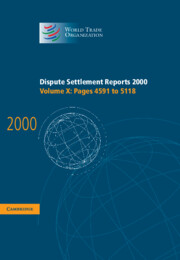Book contents
- Frontmatter
- Contents
- United States - Anti-Dumping Act of 1916 Complaint by the European Communities (WT/DS136): Report of the Panel
- United States - Anti-Dumping Act of 1916 Complaint by Japan (WT/DS136, WT/DS162): Report of the Appellate Body
- United States - Anti-Dumping Act of 1916 Complaint by Japan (WT/DS162): Report of the Panel
- Canada - Certain Measures Affecting the Automotive Industry (WT/DS139, WT/DS142): Award of the Arbitrator under Article 21.3(c) of the DSU
- Canada - Term of Patent Protection (WT/DS170): Report of the Appellate Body
United States - Anti-Dumping Act of 1916 Complaint by Japan (WT/DS162): Report of the Panel
Published online by Cambridge University Press: 13 December 2017
- Frontmatter
- Contents
- United States - Anti-Dumping Act of 1916 Complaint by the European Communities (WT/DS136): Report of the Panel
- United States - Anti-Dumping Act of 1916 Complaint by Japan (WT/DS136, WT/DS162): Report of the Appellate Body
- United States - Anti-Dumping Act of 1916 Complaint by Japan (WT/DS162): Report of the Panel
- Canada - Certain Measures Affecting the Automotive Industry (WT/DS139, WT/DS142): Award of the Arbitrator under Article 21.3(c) of the DSU
- Canada - Term of Patent Protection (WT/DS170): Report of the Appellate Body
Summary
INTRODUCTION
On 10 February 1999, Japan requested consultations with the United States pursuant to Article 4 of the Understanding on Rules and Procedures Governing the Settlement of Disputes (hereinafter the “DSU”), Article XXII:1 of the General Agreement on Tariffs and Trade 1994 (hereinafter the “GATT 1994”) and Article 17.2 of the Agreement on Implementation of Article VI of the General Agreement on Tariffs and Trade 1994 (hereinafter the “Anti-Dumping Agreement”) regarding Title VIII of the US Revenue Act of 1916, also known as the US Anti-Dumping Act of 1916 (hereinafter the “1916 Act”).
Consultations were held on 17 March 1999, but did not lead to a mutually satisfactory resolution of the matter.
On 3 June 1999, Japan requested the Dispute Settlement Body (hereinafter the “DSB”) to establish a panel pursuant to Article XXIII of the GATT 1994, Articles 4 and 6 of the DSU and Article 17 of the Anti-Dumping Agreement. Japan claimed that the 1916 Act was inconsistent with Article III:4 of the GATT 1994; Article VI of the GATT 1994 and the Anti-Dumping Agreement, in particular Article VI:2 of the GATT 1994 and Article 18.1 of the Anti-Dumping Agreement as well as Articles 1, 2, 3, 4, 5, 9 and 11 of the Anti-Dumping Agreement; Article XI of the GATT 1994; and Article XVI:4 of the Marrakesh Agreement Establishing the World Trade Organization (hereinafter the “WTO Agreement”) and Article 18.4 of the Anti- Dumping Agreement.
On 26 July 1999, the DSB established a panel pursuant to the request made by Japan, in accordance with Article 6 of the DSU. In document WT/DS162/4, the Secretariat reported that the parties had agreed that the panel would have the standard terms of reference. The terms of reference are the following:
“To examine, in the light of the relevant provisions of the covered agreements cited by Japan in document WT/DS162/3, the matter referred to the DSB by Japan in that document and to make such findings as will assist the DSB in making the recommendations or in giving the rulings provided for in those agreements.”
- Type
- Chapter
- Information
- Dispute Settlement Reports 2000 , pp. 4831 - 5078Publisher: Cambridge University PressPrint publication year: 2003

